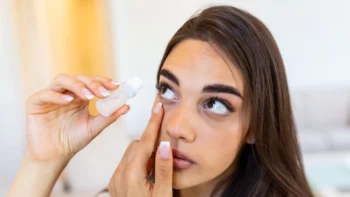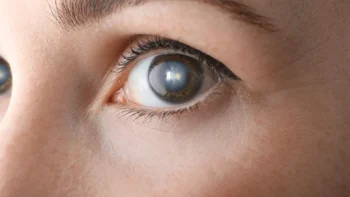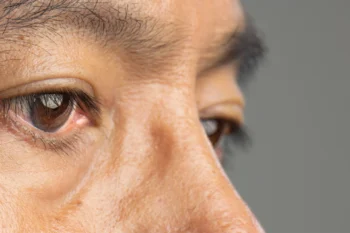Have you ever considered how important your eyes are? Humans rely on constant visual cues to communicate, assess situations, and complete numerous everyday tasks. A life without sight would be incomparably different, so you should never take your vision for granted.
Eye Health is Vital to Your Overall Health
Not only are your eyes integral to daily life, but they’re also an essential window to your overall health. Your eye doctor can diagnose conditions like diabetes, high blood pressure, and autoimmune diseases before your primary care doctor may notice them. This is because your eye shows blood vessels and neural tissue at the same time.
If light entering the eye doesn’t focus perfectly on the retina, it results in blurred vision. These refractive errors vary from person to person, but the most common are:
- Myopia: This is also known as nearsightedness, when distance vision is blurry.
- Hyperopia: This is also called farsightedness, when close vision is blurry, but distance vision is clear.
- Presbyopia: This happens with aging as your eye lens loses elasticity. (Do you ever hold your phone at arm’s length to read it?)
- Astigmatism: The cornea is elongated rather than round, which changes the way light passes into the retina.
Many folks see an eye doctor for vision problems, but many eye diseases progress quietly with no early symptoms. Comprehensive eye exams will expose disease, and early treatment can help you avoid permanent damage.
These conditions may include:
- Glaucoma: Pressure inside your eye can damage the optic nerve. This often correlates with age, race, and family history. Anyone with risk factors should be sure to get regular checkups.
- Cataracts: Cataracts cause cloudiness of the lens, blurring vision, or may cause night vision problems like haloes around lights. Surgery to replace the lens with an artificial one is quick, painless, and can correct other vision problems.
- Age-related macular degeneration: Cells and light-sensitive tissue in the eye degrade with age — even among those with formerly perfect eyesight.
- Diabetic retinopathy: Diabetes damages blood vessels in the retina, causing dark spots or blurred vision.
- Retinal detachment: Generally caused by trauma, the retina separating from the back of the eye is an emergency and can cause blindness.
A comprehensive annual eye exam will test eye alignment, depth perception, and eye movement along with visual acuity. It may also include dilation using eye drops to enlarge pupils, allowing your doctor a full view inside the eye.
Children, who often don’t realize they have blurry vision and might not communicate it if they did, should also have periodic eye exams. Regular eye care is critical to the health of our families, and early diagnosis and treatment can maintain your vision for your entire whole life.
Ophthalmologist, Optometrist, or Optician: Choosing an Eye Doctor
If you’ve ever wondered what the difference is between an ophthalmologist vs an optometrist — or whether an optician does the same job — you’re not alone. While all three focus on the health of your eyes, there are similarities and differences. Your eyes and individual risk factors will help you choose an eye doctor that’s the right fit. Some practices combine all these professionals to provide a team for personalized care depending on your needs.
Opticians Help with Corrective Lenses
An optician is a professional that fits, repairs, and supplies glasses and contact lenses but does not have medical training. For comprehensive yearly checks on your eye health, you need to see an optometrist or ophthalmologist.
Ophthalmologists are Medical Doctors
Ophthalmologists have the highest level of education among eye doctors. They complete medical school, an internship, a residency program, and may also do a fellowship. In addition to eye exams and vision services, they are qualified to diagnose and handle any condition related to your eye. They can perform surgery and prescribe medication.
Conditions diagnosed or treated by ophthalmologists include:
- Surgical care related to disease or conditions, such as glaucoma, cataracts, strabismus, and more
- Surgical care related to injury, such as burns, accidents, detached retina, and more
- Plastic surgery
- Rehabilitation after surgery
- All routine vision services and exams
Optometrists Focus on Primary Care
While optometrists do not go to medical school, they complete a 4-year professional program after college for a Doctor of Optometry (O.D.) degree. They may also complete fellowships in a specialty field or have additional training.
The main difference between optometrists and ophthalmologists is that optometrists do not perform major surgery. An optometrist may be trained in some laser surgeries or minor procedures — such as removal of foreign objects in the eye — but will refer patients to an ophthalmologist for other surgeries.
Optometrists provide most eye care services, including:
- Routine eye exams
- Prescriptions for glasses, contacts, and visual aids
- Diagnosis of conditions like cataracts, glaucoma, iritis, and more
- Manage chronic conditions like glaucoma, dry eye, and more
- Monitor eye conditions related to diseases like diabetes
- Provide vision therapy, such as exercises to advance visual skills
- Prescribe medication for conditions
- Follow-up care after surgery
Tips to Protect Your Vision From a Las Vegas Ophthalmologist
Annual eye exams are important for good health. See an eye doctor immediately if you have pain, double vision, excessive redness, floaters, haloes, or decreased vision. Know your family’s eye history — your doctor may order diagnostic tests for conditions you’re more likely to inherit.
There are things you can do to protect your vision that coincidentally also safeguard your overall health, such as:
- Quit smoking. Better yet, don’t start. We know smoking is bad for health, but it is also linked to cataracts, glaucoma, diabetic retinopathy, dry eye syndrome, and age-related macular degeneration.
- A healthy diet. This benefits us in many ways, but leafy greens like spinach, collards, and kale help protect your vision. Fresh fruit and other foods that are high in vitamins C, E, and beta carotene have also been proven to guard against vision loss.
- Maintaining a healthy weight. Along with staying active, this will help your eyesight and your overall health. Controlling blood pressure and cholesterol levels are critical to your health.
- Wearing sunglasses. Make sure they block UV-A and UV-B radiation from the sun. This is a small step that can help tremendously. Photokeratitis is similar to a sunburn that affects the corneas, and the damage can be long-term. Since UV exposure can add up over time, you can develop problems with your vision and even increase the risk of cataracts and macular degeneration.
Welcome to Brimhall Eye Center
If you live in the Las Vegas area, our ophthalmologists would love to meet you. We have the experience you trust, and patient satisfaction is our top goal. We ensure we take the time we need to give you personal attention and take care of your eye health. Contact Brimhall Eye today to schedule an appointment.





